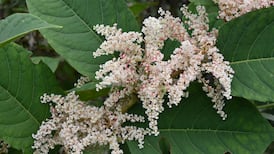Over the past few weeks, that Elvis Costello song, Good Year For The Roses just keeps popping into my head. The reason, of course, is the sun, which is not only putting a smile on all our faces but also providing the sort of heat and light that these flowering plants adore. The result is that after years of wet summers when leaves were disfigured by blackspot and tightly-closed flower-buds failed to unfurl, 2013 is fast becoming a vintage year for roses.
In my own garden, the climber ‘Madame Alfred Carrière’ is producing its blush-white, double flowers with a sort of casual abundance not seen in years. As for the centuries-old apothecary’s rose, R. ‘Rosa Mundi’, you can smell the perfume of its gaily-striped crimson-and white flowers at 20 paces. I’m almost regretting the absence of the rambling R. ‘Albertine’ that I got rid of this spring because I couldn’t face another summer of its mildewed foliage and rain-damaged flowers.
I plan to replace it this autumn with another rose, but one that shows greater disease-resistance and is repeat flowering. On my shortlist is R. ‘Gertrude Jekyll’, whose perfumed, deep pink, ruffled blooms are produced throughout the summer and which can be grown as a short climber (six to eight feet tall) – ideal for the sunny, south-facing wall once occupied by the evicted ‘Albertine’. A recipient of the RHS Award of Garden Merit, it’s a vigorous, healthy variety. Another possibility is ‘Spirit of Freedom Climbing’, another repeat-flowering climbing rose with soft pink, fragrant, double flowers, and very good disease resistance. The third is R. ‘James Galway’, also pink, also floriferous, also repeat-flowering, also robust and also with good disease resistance. The fourth variety I’m considering is R. ‘Aloha’, famed for its vigour and for its repeated flushes of scented, salmon-pink double flowers that remain unspoilt by heavy rain.

With thousands of roses in cultivation and many different types – hybrid tea, floribunda, shrub, climber, rambler, miniature – the choice can be baffling. Now is a great time to visit gardens such as St Anne’s Park in Raheny, see the varieties in flower, and make a list of any that take your fancy.
Unless your garden is very cold and/ or exposed and the soil is very heavy (in which case plant in February/March), the best time to plant is in late autumn or early winter, either as bare-root or potted plants, and into a sunny, open spot with a free-draining, fertile soil enriched with garden compost or well-rotted manure. Feed established plants in spring with a granular fertiliser before mulching. Feed repeat-flowering types again in June or July and keep deadheaded. Established plants don't require watering except during drought. Pruning regimes vary with the type of rose, for details, see Dr Hessayon's The Rose Expert.
To control blackspot, mildew and aphids, some gardeners spray with a dual systemic insecticide and fungicide such as Rose Clear Ultra, beginning in early March. An organically-friendly alternative remedy for these fungal diseases is to spray with a solution of one teaspoon of baking soda mixed with one gallon of water and a squirt of washing-up liquid. Greenfly can be treated with an organically-approved pyrethrum-based spray. Always collect and burn diseased leaves.
If I could grow only one rose ...
Dermot O' Neil, broadcaster, garden writer and author of Roses: "It's got to be R. 'Harry Edland', an profusely-flowering floribunda rose with large, mauve blooms that's the most intensely scented of all the many different roses that I grow here in Clondeglass. It's just exquisite."
Award-winning garden designer Andrew Glenn-Craigie (MGLDA): "Rosa 'Harlow Carr', a lovely double-pink gallica-type rose from David Austin which I recently used in a client's garden because of its toughness, its perfume and the fact that it's repeat flowering."
Robert Miller, nurseryman and owner of Altamont Plant Sales: "R. 'Reine des Violettes' – a super hybrid perpetual rose with beautifully formed, lilac/purple double blooms that, has a great scent, good disease resistance and flowers its heart out."
Val Montgomery, co-owner of Benvarden Gardens, C Antrim: "R.'York and Lancaster' (also known as R. damascena versicolor), which has been growing in the gardens here forever. I love its scented, striped, white-and-pink flowers."
John McNamara, owner of McNamara's Rose Nursery, Midleton, Co Cork which grows more than 500 varieties: "I've a lot of favourites but one of them is R. 'Tickled Pink', a disease-resistant, repeat-flowering floribunda-type with masses of scented, pink, double flowers with great rain resistance."













